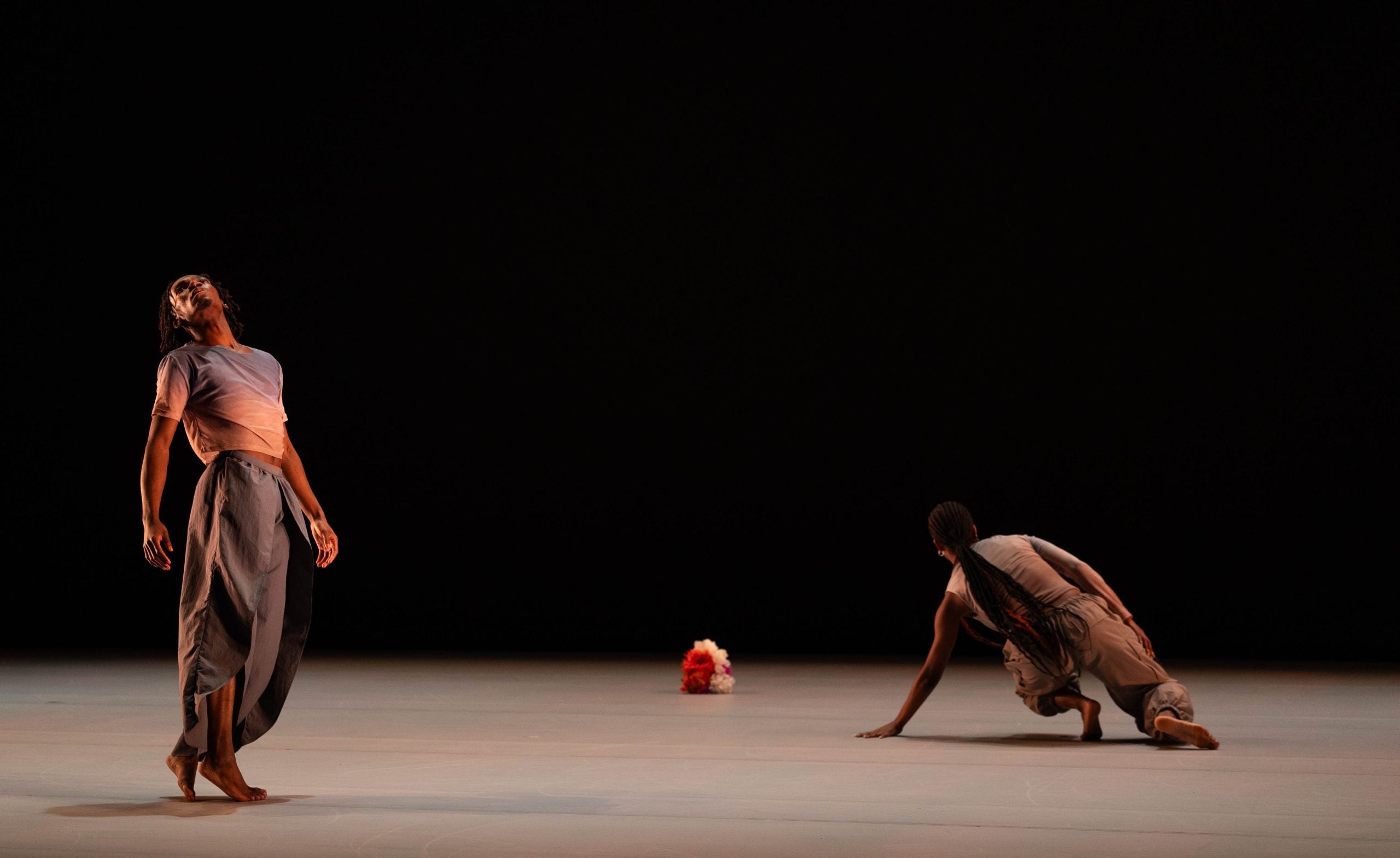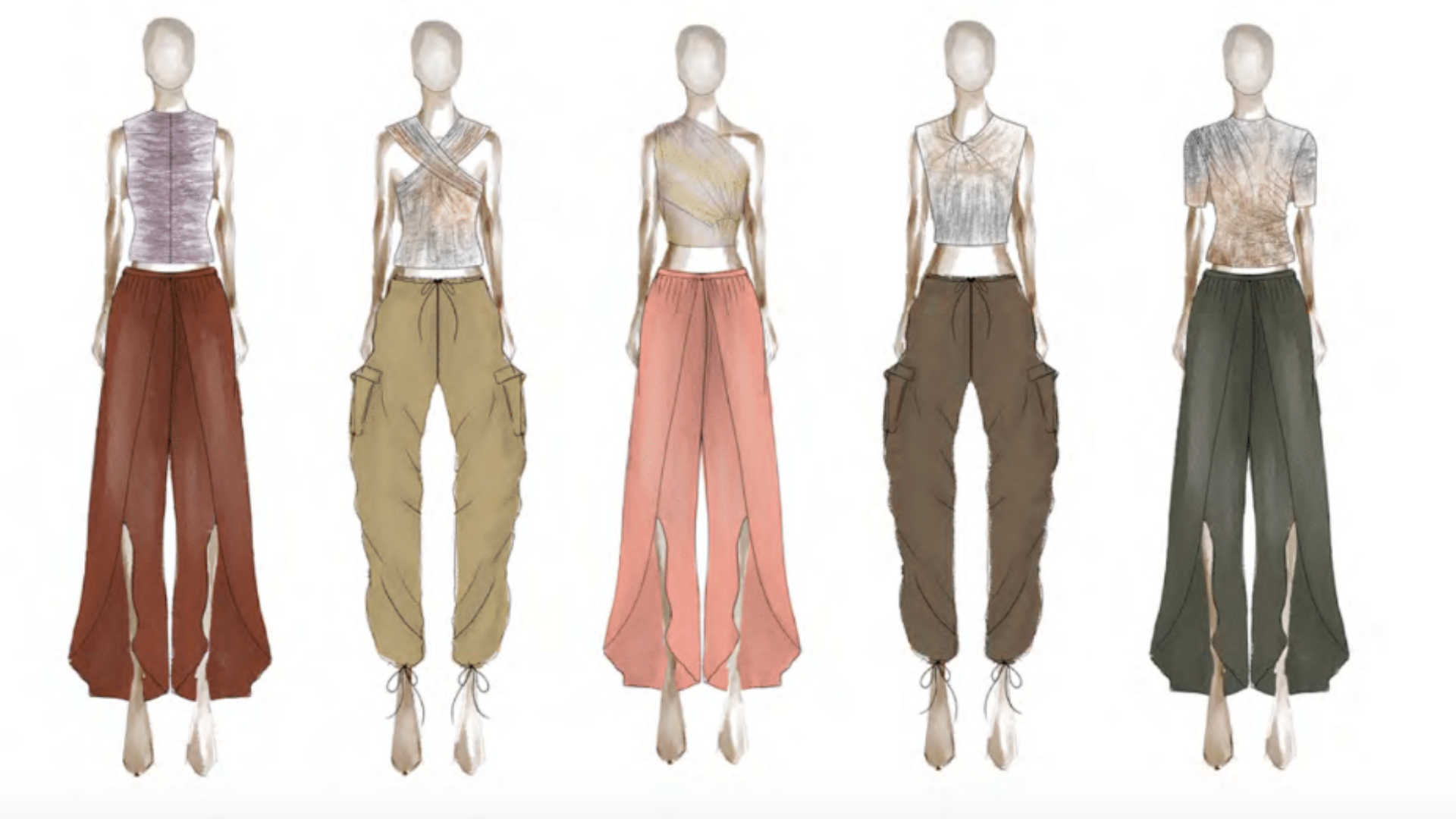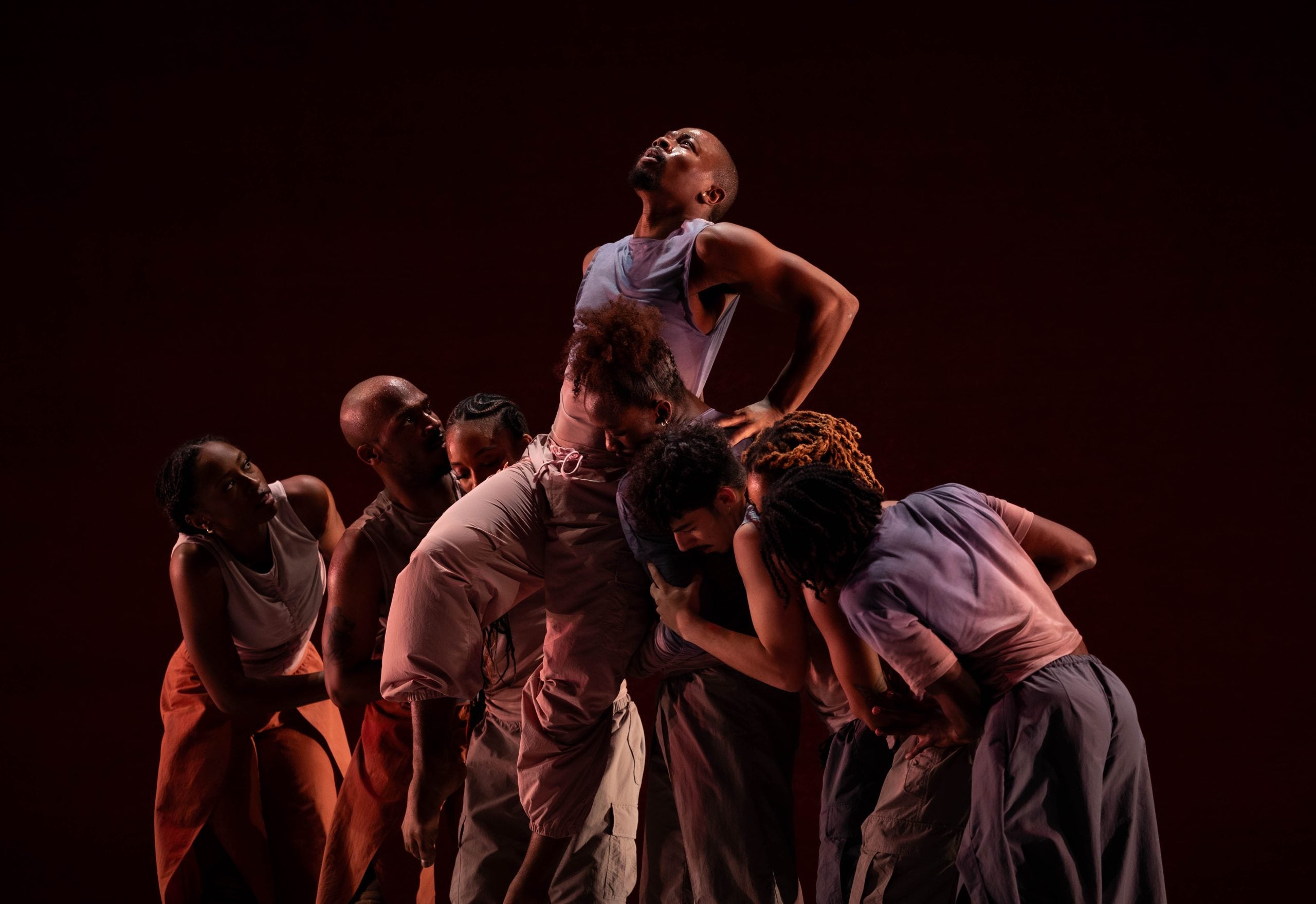
Keerati Jinakunwiphat a dancer and choreographer has been performing with A.I.M by Kyle Abraham, a dance company for nearly a decade. Both she and the eponymous founder studied at Purchase College, State University of New York, finding a mutual love for contemporary dance in different journeys in motion and physicality. Jinakunwiphat’s aptitude for stagebound worldbuilding post-grad was nurtured through A.I.M.’s self-reflexive praxis that cultivates the technique and conceptualism of the dancers at the heart of its repertoire.
Collaboration is embedded into the process, and young choreographers like Jinakunwiphat are encouraged to own their sartorial direction with whatever tools heighten the story they seek to tell. So, when Jinakunwiphat visualized her ideal costume design for her latest work, Someday Soon, she tapped Brandon Blackwood to create pieces that would amplify what makes her choreography and the dancers who would perform it so captivating. “We wanted to genuinely represent the themes in the dance piece and how they are parallels to how we tell stories through fashion,” Brandon Blackwood said.
The composition premiered at the start of the new year as part of A.I.M’s latest repertory with performances throughout the spring and summer. The partnership results from a longstanding respect for each party’s work—a connection made all the more meaningful by the members of the dance company’s alumni who have since transitioned into fashion. Imani Simmons, vice president of brand partnerships at Brandon Blackwood studied with A.I.M. for a period of time and was versed in the cross-disciplinary parallels between the worlds of design and dance. Hence the meeting of the two companies most recently was seemingly kismet.

Art, organic creative discovery, and athleticism underpin the foundations of A.I.M’s mission, in part reflecting founder Kyle Abraham’s journey toward dance. In establishing an ethos for his company, which would come to be known for longer performances grounded in a central idea for audiences, he was a product of combined influence. Early in Abraham’s career, he was exposed to the works of Ulysses Dove and the Alvin Ailey American Dance Theater, which built its model performing the work of its founding director but also works from other choreographers.
Abraham studied how this format has been expanded upon in other contemporary collectives such as the Bebe Smith Company or the Ralph Lemon Company and now leads with that same concept of collaborative choreography. Creating and staging new work is as much a meditation on the sport of dance as it is on the curation of history showing audiences where the evolving elements in today’s dance zeitgeist derive from.
“The way that I look at programming I like to think about how best to think about where my influences come from, whether they be someone in the past or someone from the next generation like Keerati Jinakunwiphat,” Abraham notes. Jinakunwiphat has been performing with A.I.M. since graduating with her BFA from Purchase College. With the company’s most recent repertory performance, she and Abraham amplify the distinctive tapestry of Black and queer narratives in motion.
The concept for the costumes was established over time, developing in tandem with A.I.M’s rehearsal period. The Brandon Blackwood team worked closely with Jinakunwiphat as she choreographed Someday Soon—her second original work with the company following 2019’s Big Rings (sketches are below by Brandon Blackwood). “I started playing with this idea of flowers,” the artist tells ESSENCE. “I was just in a place in my life where I was trying to really allow myself to accept the love that I was being given, whether it’s in like relationship, success, career, any of those things,” Jinakunwiphat adds.

Last winter, Keerati made history as the first Asian American woman commissioned by New York City Ballet to create a new work in the company’s 75-year history. Keerati says that though it was a historic accomplishment, it was also overwhelming. As she processed being on the receiving end of high accolades, she identified how flowers represent the push and pull of validation in her work and personal life.
As the curtain rises for the number, two earth-tone-outfitted dancers stand before a gradient backdrop as a bouquet lays downstage. Tyler, the Creator’s explosive “IGOR’S THEME” scores the moment they are joined by more dancers in an undulating canvas of light and motion. Their movements are fluid and seamless, highlighted by the warm, soft hues of the custom-dyed costumes Brandon Blackwood constructed for the performance. “For the tops we used double-lined a four-way mesh, best for movement, and nylon for the cargo pants,” Blackwood explains. He adds that when developing a color palette with Keerati, she expressed how she wanted emotive yet gender-neutral hues.

Dancers Jamaal Bowman, Juan Carlos Franquiz, II, Amari Frazier, Mykiah Goree, Faith Joy Mondesire, Donovan Reed, Keturah Stephen, and Gianna Theodore construct a fluid canvas of externalized longing pointing to then away from the bouquet at oscillating points. As Keerati explains, the bouquet is tied to a string offstage, trailing the dancers’ movements and stopping when they pause. The flowers evade them as they move between chasing its proverbial validation and trying to escape it.
“It follows the dream of someday soon, you’ll get what you want or what you think you want. Or at least that you’ll have that feeling,” Keerati explains. Over the course of the number, the flowers move through many forms as an object of aspiration to be feared and coveted. To highlight this relationship, Keerati aptly scored later parts of the performance to Tyler, The Creator’s track “EXACTLY WHAT YOU RUN FROM YOU END UP CHASING.”
With such a resonant subtext, Blackwood sought to amplify both the intentionality of movement and the visual cohesion of the performance. He has previously ventured into costume design, perhaps most famously with creating custom gown, gloves, and heels for Beyoncé’s Renaissance Tour, and handled this collaboration with the same meticulous attention.
Blackwood shares that with costume design he believes it is imperative to custom-fit the fabric in a seamless fashion to provide comfort and aesthetically pleasing pieces. “My vision is always to enhance the greatness of the person wearing the clothes; whether it is when we are doing a gown for a red carpet, or this dance performance, I want to make sure that the dancers feel comfortable and that the clothing is an extension of themselves and the story that they are telling to the world,” Blackwood shares.
There were several fittings during this process. Blackwood and his team wanted to ensure that in every move the dancers made, the fabric moved with them exactly where they wanted it to on the body. “The color of the tops was really special as I worked with our design team to make our very own gradient color print,” Blackwood continues.
The overall performance deals with questions of past, present, and future, with answers achieved through multiple partnerships of artistic focus. Jinakunwiphat’s choreographic genius anchors A.I.M. by Kyle Abraham’s electrifying resonance of Black and queer cultural histories, referencing an esteemed tradition while still feeling palpably current. Someday Soon is a vivid exploration of the personal complexes that exist in gradience, calling upon dancers and audience members alike to face their uncertainty. There is an idea of multiple truths approached in various approaches from costumes to choreography.
“We hope the audience was able to understand and see the modernity and sentiment in the clothing. The color story was purposely chosen to represent the softness and vulnerability in all people and to blend with the body in a way the movement of dancers can truly shine,” Blackwood adds.







